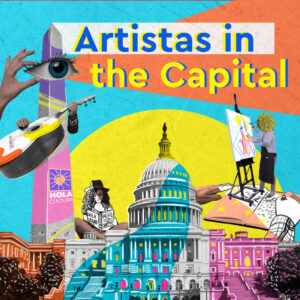
In this month’s episode, choreographer Gabriel Mata discusses dance and self-expression
By hola | Published

Gabriel Mata (photo by Bill Cameron)
The United States is the country with the most immigrants in the world, with 45.3 million immigrants as of 2021. Regardless of where they go, immigrants carry their culture with them. Culture binds them to their identity and community through art, food, dance, music and more.
Through his work, Gabriel Mata seeks to shed light on the experiences and perspectives of those who have been overlooked or underrepresented in mainstream discourse. He has created motion memoirs, which are “performances centered around movement.” It’s a subject matter he knows intimately due to his personal journey from being an undocumented immigrant to gaining residency through Deferred Action for Childhood Arrivals (DACA) to now having permanent residency.
“It was through dance that I learned how to have a voice since it was during a time when I [felt I] didn’t legally have a voice. [I learned] how to relate narratives from underserved communities, such as Latinx undocumented migrants,” says Mata.
As a queer Latinx artist, Mata wants to create a space for performing and sharing stories that make minorities feel represented. Still, he also acknowledges that “queerness can look a million different ways, and Latinx can look a million different other ways.”
“I’m here sharing my own perspective and also sharing the questions that I can’t answer,” says Mata. “To me, a queer Latinx artist means one volume of a million volumes.”
In this episode, Mata will delve into the challenges, triumphs and inspirations that have accompanied him on his artistic path. He will discuss how his background has influenced his work, providing a deeper understanding of the themes and messages he conveys.
“It was some part of me that thought beyond dancing as fun but dancing as a form of protest, but also of understanding myself in my body,” says Mata. “It continues to inspire me to create work and push the barrier of highlighting the kinds of moving we can do.”
About “Artistas in the Capital”

The interviews were conducted by interns in Hola Cultura’s Storytelling Program for Experiential Learning (SPEL). SPEL is dedicated to bringing together D.C. high school and college interns with fellows and mentors for story lab sessions and workshops that prepare them for their futures through the production of accurate digital media published on the Hola Cultura website.
Listen now to the latest episode and gain insight into the world of this exceptional artist as we explore the complexities of his artistic expression and the impact of his personal journey.
— Story by María Fernanda Gómez
— Edited by Michelle Benitez
Meet our “Artistas
in the Capital”
podcast team…

Claudia Peralta Torres
A classically trained guitar player recognized by the Grammy Foundation while still in high school, Claudia Peralta Torres planned to pursue a career in music. During her first year at Virginia Commonwealth University (VCU), however, she decided to study journalism after attending a school fair and learning more about the profession from VCU journalism students and professors.
During her time at the Richmond, Virginia-based university, Peralta Torres studied mass communications, with a focus on broadcast journalism and a minor in psychology.
Before she earned a Bachelor of Science degree with honors at VCU’s Robert T. Robertson School of Media and Culture, the Peruvian storyteller and video editor was part of a music program at her Manassas high school that the GRAMMY Foundation named as one of 13 “Signature Schools” nationwide for their commitment to the performing arts. So it seems fitting that she would lead our new podcast, “Artistas in the Capital,” featuring local Latinx artists, musicians and other creatives.
Peralta Torres joined Hola Cultura in June of 2022. She served as the Editorial Fellow for the Society and Culture team in our Storytelling Program for Experiential Learning (SPEL) for the next two semesters and then as the Arts & Humanities team fellow for the spring 2023 semester. Peralta Torres also assisted with the launch of our first podcasts. She says she has continued working at Hola Cultura because she enjoys the stories and perspectives that Hola Cultura shares and connecting with people who share her interest in journalism.
Not only is Peralta Torres the producer and lead editor for our latest audio production, she is also part of our social media team. Previously, she worked on the Hola Cultura podcast “The Climate Divide” and was the lead producer of our fall 2022 podcast, “Undocu-Life.”
“Artistas in the Capital” was inspired by the intriguing interviews conducted by SPEL’s Arts and Humanities team over the years.
“Listening to all of these interviews with these artists has honestly been so inspiring and motivating,” says Peralta Torres, whose work has involved overseeing the podcast’s production, editing recordings and selecting appropriate music. She also helps with marketing the podcast on social media.
“I hope everyone continues to listen to our podcast and show some love and support for the amazing artists featured,” she says.




